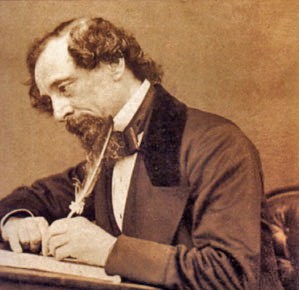 The story goes that when the ship carrying the last instalment of The Old Curiosity Shop arrived in New York in 1841, it was met by hordes of fans on the dockside, all desperate to know, ‘Is Little Nell dead?’
The story goes that when the ship carrying the last instalment of The Old Curiosity Shop arrived in New York in 1841, it was met by hordes of fans on the dockside, all desperate to know, ‘Is Little Nell dead?’
Charles Dickens was a master of the serialised novel, each instalment ending with a cliffhanger to keep the punters wanting more. Serialised fiction fell out of fashion in the 20th century, but it’s coming back in a big way in the 21st – we have a small screen continually with us, in the shape of our smartphone, just perfect for a daily short read in those idle moments.
The Pigeonhole is one of the leaders in this area: launched in 2014, it’s an ‘online book club’ offering bite-sized bits of books (called ‘staves’) to your mobile for snacking on during your commute. Wattpad, where more and more of the world’s stories are beginning, has thousands of serialised stories, and fans of romance can choose between Simon & Schusters Crave and Harlequin’s BookBreaks apps for a mini-fix of erotica direct to their mobile. And now Penguin Random House and Crown Publishing Group have just launched Season of Stories, ‘three months of hand-picked short stories delivered directly to your inbox’ to take you through to the end of 2016.
To be a true serial, though, there must be some openness in the ending: Dickens apparently changed the fate of a character in Dombey and Son following an outcry from readers. There’s a different dynamic to both reading and writing in real time, it allows a two-way conversation. And it also means that while each instalment builds on the last and leads on to the next it has an integrity of its own, it can stand alone.
This is something like the method I encourage my clients to adopt when they’re writing their business books: rather than writing the whole damn thing in your room with the door shut, get it out there in a blog, talks, workshops, vlogs. Let it start finding its audience, building engagement, shaping your own thinking and holding you accountable for getting it written, week by week.
Dickens was a savvy businessman: he earned good money from his magazines such as Household Words and All The Year Round in which he serialized his novels, which appealed to a massive market because of their low price, and then he earned more money from the sale of the stories in book form to well-heeled readers, and more again from the book tours and readings. Smart.
And for those of us who aren’t Dickensian in stature when it comes to writing, here’s some advice from the great man to an aspiring writer:
‘Let me counsel you to have the patience to form yourself carefully, and the courage to renounce the endeavour if you cannot establish your case on a very much smaller scale. You see around you every day, how many outlets there are for short pieces of fiction in all kinds. Try if you can achieve any success within these modest limits (I have practised in my time what I preach to you), and in the meantime put your three volumes away.’
Or in other words: ‘Start blogging, it’ll help you write a better book.’
